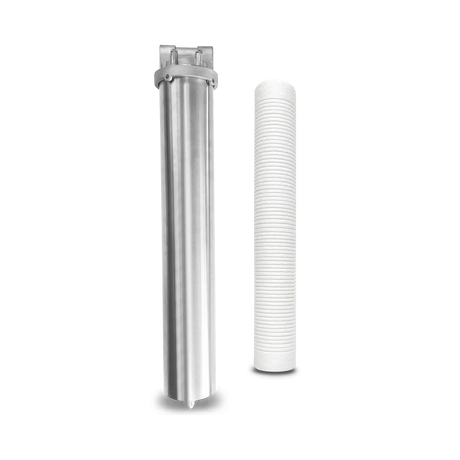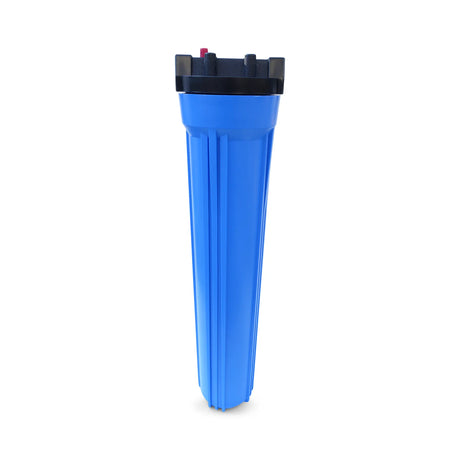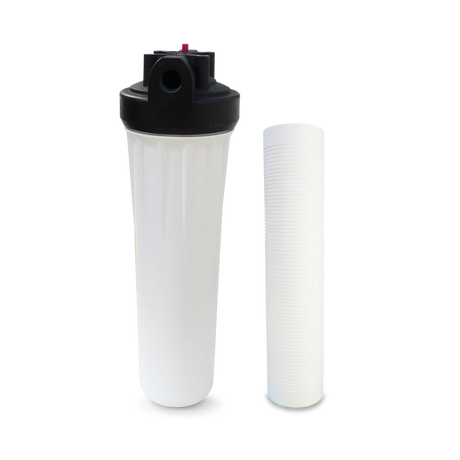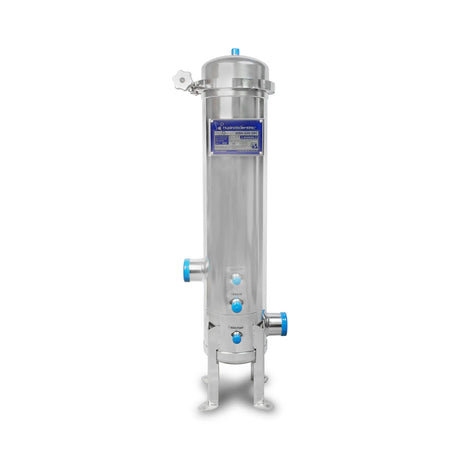Tankless Water Heaters: Ultimate Guide to Benefits, Costs, and Essential Filtration
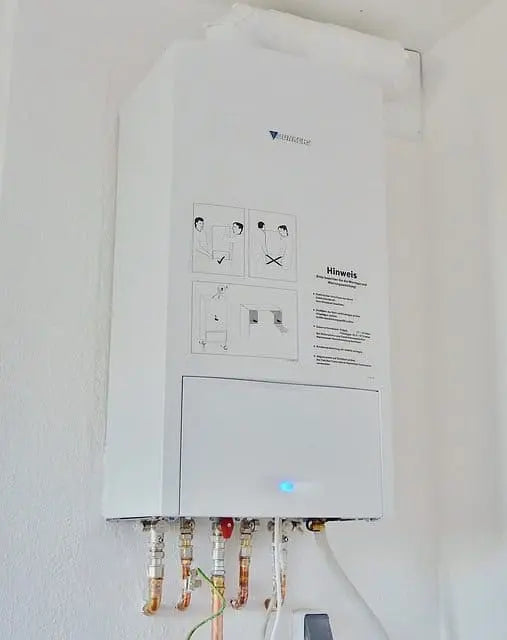
Introduction to Tankless Water Heaters
Most homes have traditionally relied on hot water tanks or boilers for their water heating needs. However, tankless water heaters have gained significant popularity in recent years. You may recognize (or even own) tankless water heaters from manufacturers such as Rinnai, Rheem, Noritz, Navien, or Bosch.
The rising popularity of tankless water heaters is largely due to their energy efficiency. As electricity and gas bills continue to climb, more homeowners are making the switch. In fact, installing a tankless water heater can lead to savings of between 21% and 43% on annual water heating costs!
In this comprehensive guide, we'll explore what tankless water heaters are, how they work, their advantages and disadvantages, and why proper filtration is crucial for these systems.
A Complete Guide to Understanding Tankless Water Heaters
The fundamental difference between tankless water heaters and traditional systems is simple. Traditional water heaters use a significant amount of electricity or gas to preheat and store water in their tanks. They also consume energy to keep that water warm until it's used.
Tankless water heaters, on the other hand, heat water on-demand, resulting in much lower energy consumption.
How Tankless Water Heaters Work
Tankless water heaters use a powerful heat exchanger to raise the water temperature. Heat exchangers transfer heat from one source to another and are found in various appliances like air conditioners, refrigerators, and car radiators.
In tankless water heaters, the process works as follows:
- When you turn on a hot water tap, cold water flows into the heater.
- The incoming water flow activates the heat exchanger.
- Electric coils or a gas-fired burner quickly heats the water to a preset temperature.
- The heated water flows out to your faucet or appliance.
Types of Tankless Water Heaters
Tankless water heaters come in two main types:
- Point of Use Systems: Smaller units designed to heat water for one or two outlets. These can often be installed in kitchen or bathroom cabinets due to their compact size.
- Whole House Systems: Larger units capable of heating water for multiple outlets simultaneously. These are typically more expensive and require more space.
Additionally, tankless water heaters can be categorized by their power source:
- Electric: Usually used for point-of-use systems.
- Gas: Can be powered by propane or natural gas, typically used for whole-house systems.
Understanding Lag Time
Lag time, the duration it takes for heated water to reach your faucet, is a crucial consideration when installing a tankless water heater. This is particularly important for whole-house systems in larger homes, where lag time can be several minutes long. As a result, water consumption may increase compared to traditional systems, even as heating costs decrease.
Advantages of Tankless Water Heaters
1. Long-term Energy Savings
One of the primary benefits of tankless water heaters is their energy efficiency. According to the US Department of Energy, hot water typically accounts for about 20% of a household's annual energy bill. Switching to a tankless system can reduce these costs by 21% to 43%. The US Department of Energy estimates improved energy efficiency of 24% to 34%. Even homes with high hot water consumption can benefit from these savings.
2. Longer Lifespan
While the average traditional boiler system has a lifespan of about 10 years, a well-maintained tankless water heater can easily last 20 years or more.
3. Potential Water Savings
Water savings can vary depending on the household and the type of tankless system installed. Point-of-use systems, in particular, can reduce water waste by delivering hot water faster to remote faucets, eliminating the need to run the tap while waiting for hot water to arrive.
4. Unlimited Hot Water On Demand
Tankless water heaters provide a continuous supply of hot water. As long as your water flow isn't interrupted, you can expect an indefinite source of hot water. Most units can deliver between two to five gallons per minute, allowing multiple hot water uses simultaneously.
5. Reduced Risk of Leaks or Bursts
Traditional water tanks can leak or burst, causing significant water damage. Tankless systems have a much lower risk of such catastrophic failures since they don't store large volumes of water.
6. Space Savings
Tankless units are significantly smaller than traditional 50-gallon tanks. This compact size allows for more flexible installation options and frees up valuable storage space in your home.
7. Precise Temperature Control
Many tankless systems offer multiple temperature settings, some with up to four different presets. They also use bypass and mixing valves, providing temperature compensation and eliminating issues with water pressure and temperature fluctuations over time.
8. Federal Tax Rebates
As an added financial benefit, many tankless water heating systems qualify for a $300 federal tax rebate.
Disadvantages of Tankless Water Heaters
1. Higher Initial Costs
While tankless water heaters offer long-term savings, they have higher upfront costs. Installation can range from $2,800 to $4,500, depending on the model and installation requirements. This can be up to three times the cost of installing a traditional system. Additionally, homes may require retrofitting work, as they're typically not built with tankless systems in mind.
2. Minimum Flow Rate Requirement
Most tankless units require a minimum flow rate of about 0.5 gallons per minute to activate. This can lead to lag time, even with point-of-use systems, which may result in increased water usage in some scenarios.
3. Vulnerability to Power Outages
Unlike traditional tanks that store hot water, tankless systems cannot provide hot water during power outages. This can be a significant drawback in areas prone to frequent power disruptions.
Why Water Filtration Matters for Tankless Water Heaters
Understanding Scale Build-up
Scale, also known as mineral build-up, is a consideration for all water heating systems, but it can be particularly problematic for tankless units. Scale is typically composed of calcium and magnesium deposits from hard water.
While scale itself is unlikely to cause health issues, it can lead to:
- Decreased system efficiency
- Premature damage to the water heater
- Damage to pipes, shower heads, and faucets
- Potential system failure over time
Why You Need a Tankless Water Heater Filter
If you have a tankless water heater, using a tankless water heater filter with scale protection is essential. A proper filter ensures that the water entering your system is free from scale-causing minerals.
Regular use and maintenance of a filter can significantly extend the life and efficiency of your tankless water heater. It's crucial to change your tankless water heater filter regularly for optimal performance.
How Tankless Water Heater Filters Work
At Premiere Sales, our tankless water heater filters use Siliphos, a "threshold inhibitor" that stabilizes water and prevents scale formation. Siliphos works by:
- Preventing scale formation through its molecular structure
- Loosening existing deposits over time, allowing them to be flushed away
- Providing ongoing protection against new scale formation
It's important to note that while Siliphos is effective at preventing new scale formation, its impact on existing scale varies:
- Brown scale (iron oxide and hydroxide) can be removed over a period of 4 days to 6 months or more
- White scale (calcium carbonate or silicate) is less affected but effectively prevented from further buildup
Remember, Siliphos primarily acts as a scale inhibitor rather than a descaler, which is why it's crucial to install a tankless water heater filter as soon as possible.
Key Takeaways for Choosing the Best Tankless Water Heater & Filter
Tankless water heaters offer numerous benefits, including energy savings, unlimited hot water, and space efficiency. However, they also come with some drawbacks, such as higher initial costs and the need for proper maintenance.
If you have a tankless water heating system installed or are considering making the switch, investing in a tankless water heater filter with scale inhibitor is highly recommended. Many of our tankless water heater systems come with such filters included.
We offer a wide range of scale filters for tankless water heaters, suitable for both point-of-use and whole-house systems. Make the smart choice for your home and your wallet by protecting your investment with proper filtration.
By understanding the pros and cons of tankless water heaters and the importance of filtration, you can make an informed decision that best suits your household's needs and ensures the longevity of your water heating system.


